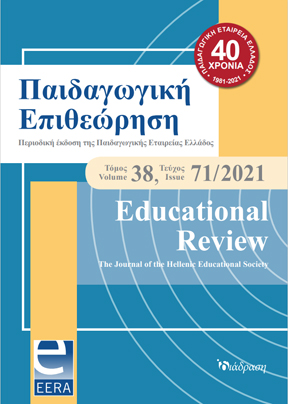Κριτικός γραμματισμός και Συμπερίληψη: ένα ενδεικτικό σχέδιο μουσειοπαιδαγωγικής δράσης
Main Article Content
Περίληψη
The effectiveness of experiential learning in teaching children with and without learning difficulties is considered valuable. The ability to replace regular “learning tools” which require specific dexterities, such as reading and writing, with alternative ways of learning, motivates students with learning difficulties into the process of acquiring new knowledge. In particular, the main advantage offered by museums compared to the other learning environments, lies in the fact that they help arouse students’ learning interest by presenting tangible exhibits directly accessible to the human senses. In this way, students develop their observation and imagination skills, express their own thoughts and discover new knowledge in an experiential way. This paper presents a museum-pedagogical action plan that was implemented in the context of teaching Modern Greek Language and Physics in A΄, B΄ and C΄ High School classes and included the interdisciplinary method as well as the experiential approach of the concept of sound and communication. All of the students (either with or without learning difficulties) participated together interactively with a view to forming an inclusive attitude and philosophy. The aim of this study is to highlight museum-pedagogical methods through the “participation-experience-creation” scheme and to present museums as a vehicle of promoting critical literacy and inclusion.
